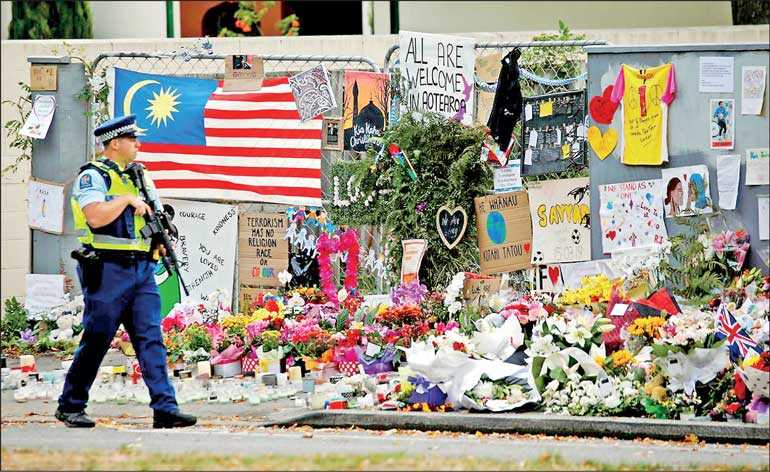Monday Feb 23, 2026
Monday Feb 23, 2026
Friday, 22 March 2019 00:00 - - {{hitsCtrl.values.hits}}

CHRISTCHURCH (Reuters): New Zealand will ban military-style semi-automatic and assault rifles under tough new gun laws following the killing of 50 people in the country’s worst mass shooting, Prime Minister Jacinda Ardern said on Thursday.
In the immediate aftermath of last Friday’s shootings at two mosques in Christchurch, Ardern labeled the attack as terrorism and said New Zealand’s gun laws would change.
“On 15 March our history changed forever. Now, our laws will too. We are announcing action today on behalf of all New Zealanders to strengthen our gun laws and make our country a safer place,” Ardern told a news conference.
“All semi-automatic weapons used during the terrorist attack on Friday 15 March will be banned.”
Ardern said she expects the new laws to be in place by 11 April and a buy-back scheme will be established for banned weapons.
The buyback would cost up to NZ$200 million ($138 million), she said.
All military style semi-automatics (MSSA) and assault rifles would be banned, along with parts used to convert weapons into MSSAs and all high-capacity magazines.
Under existing New Zealand gun laws, a standard A-category gun license allows semi-automatics limited to seven shots. Live-streamed video of a gunman in one of the mosques showed a semi-automatic weapon modified with a large magazine.
Australia banned semi-automatic weapons and launched a gun buy-back after the Port Arthur massacre in 1996 in which 35 people were gunned down.
Ardern said that similar to Australia, the new gun laws will allow for strictly enforced exemptions for farmers to conduct pest control and animal welfare.
“I strongly believe that the vast majority of legitimate gun owners in New Zealand will understand that these moves are in the national interest, and will take these changes in their stride.”
Lots of guns
New Zealand, a country of less than five million people, has an estimated 1.2-1.5 million firearms, around 13,500 of them MSSA type weapons.
Most farmers in the South Pacific country own guns, which they use for killing pests such as possums and rabbits, and for putting down injured stock. Recreational hunting of deer, pigs and goats is popular for sport and food, while gun clubs and shooting ranges dot the country.
That has created a powerful lobby which has thwarted previously attempts to tighten gun laws after other mass shootings in New Zealand and overseas.
Federated Farmers, which represent thousands of farmers, said it supported the tough new gun laws.
“This will not be popular among some of our members but...we believe this is the only practicable solution,” Federated Farmers Rural Security spokesman Miles Anderson said in a statement.
The main opposition National Party, which draws strong support in rural New Zealand, said it also supported the ban.
The changes exclude two general classes of firearms which are commonly used for hunting, pest control, stock management on farms, and duck shooting.
“I have a military style weapon. But to be fair, I don’t really use it, I don’t really need it,” said Noel Womersley, who slaughters cattle for small farmers around Christchurch. “So I’m quite happy to hand mine over, to be fair.”
Ardern said a further tranche of reforms will cover the firearm registry and licensing.
Mosques to reopen for Friday prayers
Mohammed Faqih, a member of the Islamic clergy who flew in from California and attended the funerals for some victims on Thursday, said he was “extremely grateful” for the gun ban.
“I wish our leaders in the States would follow on her footsteps and do the same thing especially given our history of mass shootings,” he said. “Something needs to happen and it’s a great example for our elected leaders.”
The first victims were buried on Wednesday and burials continued on Thursday, with the funeral of a school boy.
A mass burial is expected to be held on Friday.
The bullet-riddled Al Noor mosque was being repaired, painted and cleaned ahead of Friday prayers.
Ardern will attend the Muslim call to prayer and a two-minute silence at Hagley Park opposite the Al Noor Mosque. The call to prayer will telecast nationally.
Armed police have been guarding mosques around New Zealand since the attacks. “We will have a heightened presence tomorrow in order to provide reassurance to people attending the Friday call for prayers,” police said in a statement on Thursday.
Thousands of worshippers are expected at the Al Noor mosque, where the majority of victims died.
Most victims were migrants or refugees from countries such as Pakistan, India, Malaysia, Indonesia, Turkey, Somalia, Afghanistan and Bangladesh.
Australian Brenton Tarrant, 28, a suspected white supremacist who was living in Dunedin, on New Zealand’s South Island, has been charged with murder following the attack.
He was remanded without a plea and is due back in court on 5 April, when police said he was likely to face more charges.
Twenty eight people wounded in the attacks remain in hospital, six still in intensive care.